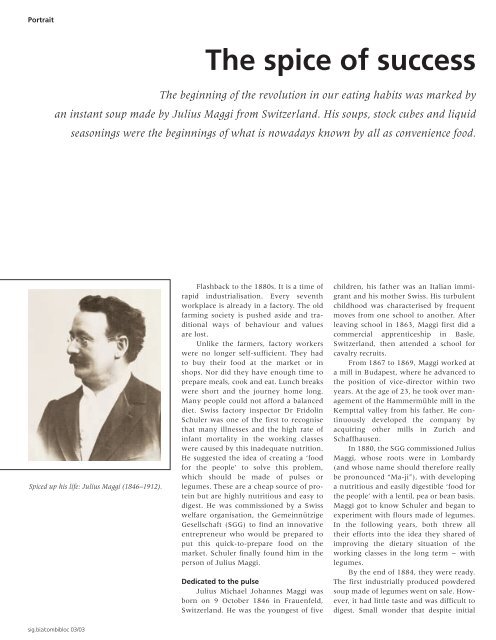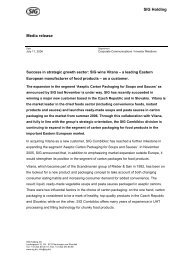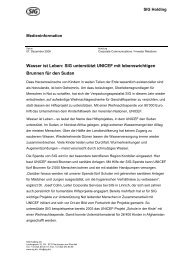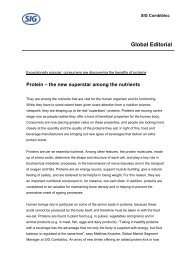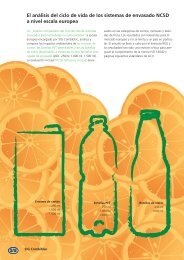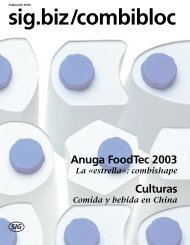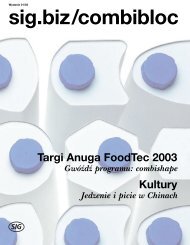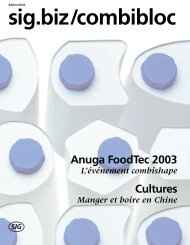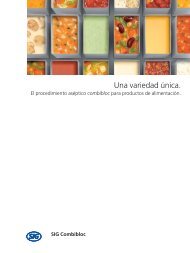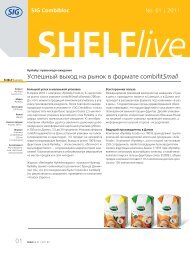Create successful ePaper yourself
Turn your PDF publications into a flip-book with our unique Google optimized e-Paper software.
Portrait<br />
<strong>sig</strong>.<strong>biz</strong>/<strong>combibloc</strong> 03/03<br />
The spice of success<br />
The beginning of the revolution in our eating habits was marked by<br />
an instant soup made by Julius Maggi from Switzerland. His soups, stock cubes and liquid<br />
seasonings were the beginnings of what is nowadays known by all as convenience food.<br />
Spiced up his life: Julius Maggi (1846–1912).<br />
Flashback to the 1880s. It is a time of<br />
rapid industrialisation. Every seventh<br />
workplace is already in a factory. The old<br />
farming society is pushed aside and traditional<br />
ways of behaviour and values<br />
are lost.<br />
Unlike the farmers, factory workers<br />
were no longer self-sufficient. They had<br />
to buy their food at the market or in<br />
shops. Nor did they have enough time to<br />
prepare meals, cook and eat. Lunch breaks<br />
were short and the journey home long.<br />
Many people could not afford a balanced<br />
diet. Swiss factory inspector Dr Fridolin<br />
Schuler was one of the first to recognise<br />
that many illnesses and the high rate of<br />
infant mortality in the working classes<br />
were caused by this inadequate nutrition.<br />
He suggested the idea of creating a ‘food<br />
for the people’ to solve this problem,<br />
which should be made of pulses or<br />
legumes. These are a cheap source of protein<br />
but are highly nutritious and easy to<br />
digest. He was commissioned by a Swiss<br />
welfare organisation, the Gemeinnützige<br />
Gesellschaft (SGG) to find an innovative<br />
entrepreneur who would be prepared to<br />
put this quick-to-prepare food on the<br />
market. Schuler finally found him in the<br />
person of Julius Maggi.<br />
Dedicated to the pulse<br />
Julius Michael Johannes Maggi was<br />
born on 9 October 1846 in Frauenfeld,<br />
Switzerland. He was the youngest of five<br />
children, his father was an Italian immigrant<br />
and his mother Swiss. His turbulent<br />
childhood was characterised by frequent<br />
moves from one school to another. After<br />
leaving school in 1863, Maggi first did a<br />
commercial apprenticeship in Basle,<br />
Switzerland, then attended a school for<br />
cavalry recruits.<br />
From 1867 to 1869, Maggi worked at<br />
a mill in Budapest, where he advanced to<br />
the position of vice-director within two<br />
years. At the age of 23, he took over management<br />
of the Hammermühle mill in the<br />
Kempttal valley from his father. He continuously<br />
developed the company by<br />
acquiring other mills in Zurich and<br />
Schaffhausen.<br />
In 1880, the SGG commissioned Julius<br />
Maggi, whose roots were in Lombardy<br />
(and whose name should therefore really<br />
be pronounced “Ma-ji”), with developing<br />
a nutritious and easily digestible ‘food for<br />
the people’ with a lentil, pea or bean basis.<br />
Maggi got to know Schuler and began to<br />
experiment with flours made of legumes.<br />
In the following years, both threw all<br />
their efforts into the idea they shared of<br />
improving the dietary situation of the<br />
working classes in the long term – with<br />
legumes.<br />
By the end of 1884, they were ready.<br />
The first industrially produced powdered<br />
soup made of legumes went on sale. However,<br />
it had little taste and was difficult to<br />
digest. Small wonder that despite initial


